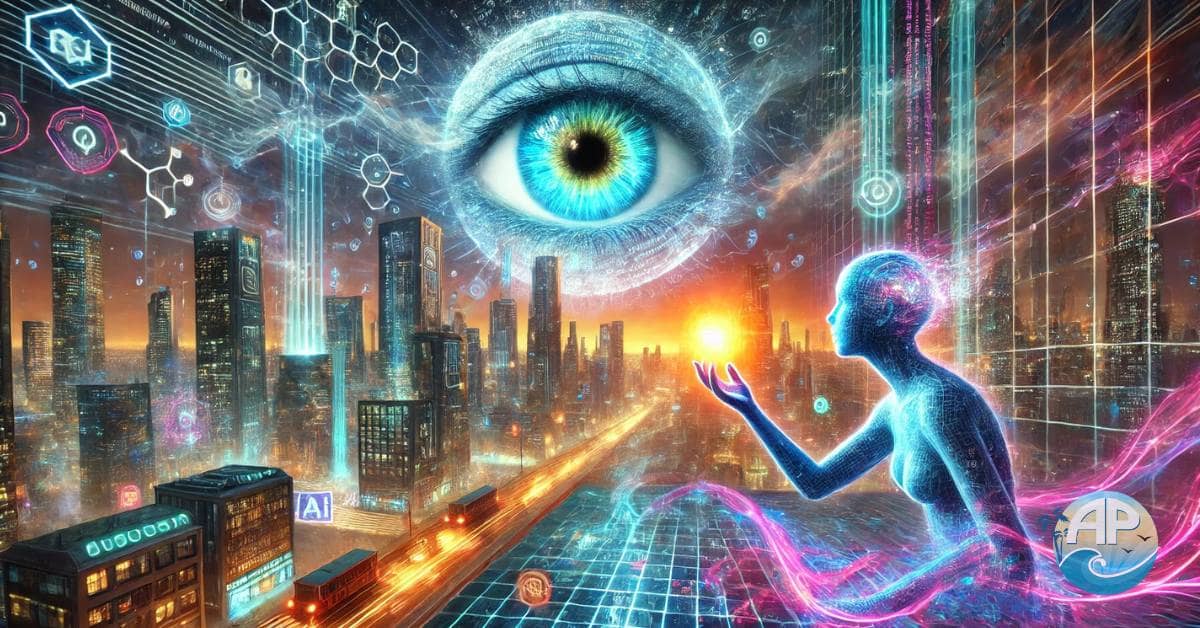The Algorithmic Horizon: Where Creativity Meets Control in the Age of AI – A Journey into the Future of Technology and Humanity
Table of Contents
- The Algorithmic Horizon
- A New Creative Revolution
- The Dark Side of AI
- The AI Arms Race
- The Future of Work
- The Ethical Imperative
- Will we control AI
The Dawn of The Algorithmic Horizon
Humanity stands at a crossroads, teetering on the edge of a digital revolution. The rise of artificial intelligence (AI) is no longer a distant theory—it is the reality unfolding before us. AI is transforming creativity, reshaping power structures, and altering the very fabric of human existence. This paradigm shift is what we call The Algorithmic Horizon—a space where innovation meets control, and where the future of human agency is at stake.
Technology, when harnessed correctly, propels us forward. It expands our capabilities, enhances our creativity, and provides solutions to problems once deemed unsolvable. However, it also brings unprecedented risks. AI can amplify inequality, manipulate reality, and centralize power in the hands of a few. The battle for AI dominance is already underway, and the stakes are higher than ever.
Are we, as a species, architects of our own liberation or prisoners of the very technology we created? This article explores the dual nature of AI—its boundless creative potential and its darker implications. As we push forward into this uncharted territory, one question lingers: Are we shaping AI, or is AI shaping us?
AI as a Muse: A New Creative Revolution
From Paintbrushes to Pixels: How AI is Reshaping Art
Art has always been a reflection of human experience—raw, flawed, and deeply emotional. Throughout history, creativity has evolved alongside technology. The printing press democratized literature. The camera revolutionized storytelling. Digital tools transformed graphic design. Now, AI is rewriting the rules of creativity itself.
AI-generated art is no longer a novelty. Algorithms can now paint, compose music, and even write poetry with startling precision. Programs like DALL·E and MidJourney generate images that rival human-made art. Music platforms use AI to craft symphonies indistinguishable from those composed by human hands. AI-driven writers produce articles, scripts, and novels in seconds. But does this explosion of artificial creativity enhance or dilute true artistic expression?
The Death of Originality?
Creativity thrives on imperfection, on the unpredictable spark of human intuition. AI, however, learns by mimicking patterns. If all art is driven by data, will originality suffer? A world where AI-generated content dominates risks becoming a loop of recycled ideas, a universe of predictability where creativity is nothing more than a mathematical equation.
If AI-generated works saturate the market, what happens to the human artist? Will they evolve alongside AI, or become obsolete? Is art still art if no human soul has touched it? These questions remain unanswered, but they force us to reconsider the essence of creativity itself.
Who Owns the Art? The Ethics of AI-Generated Creativity
Ownership is another contentious issue. If an AI paints a masterpiece, who owns it? The programmer? The user? The AI itself? Copyright laws struggle to keep up with this new reality. Lawsuits have already begun, with artists claiming AI models steal from their original works. If AI is trained on human art, is it an innovator or a plagiarist?
As AI’s role in creativity grows, we must define clear ethical guidelines. Otherwise, we risk reducing human artists to mere data providers for machines that replicate their essence without acknowledgment.
The Dark Side of AI: Control and Manipulation
The Power to Deceive: AI and the Death of Truth
AI’s ability to generate art and text is not limited to entertainment—it is also a powerful tool for deception. Deepfake technology has made it possible to fabricate videos so convincing that even experts struggle to tell them apart. Politicians can be made to say things they never said. Historical footage can be altered in ways that rewrite reality itself.
In an era where misinformation spreads like wildfire, AI threatens the very concept of truth. If we can no longer trust our eyes and ears, what happens to our perception of reality?
Algorithmic Bias: The Silent Manipulator
Bias is another insidious problem. AI is not neutral—it reflects the biases of its creators and the data it is trained on. Facial recognition systems misidentify people of color at alarming rates. Hiring algorithms favor candidates from certain backgrounds over others. AI-driven criminal sentencing tools disproportionately punish marginalized communities.
These biases are not accidental. They are embedded within the systems that shape modern society. If AI decides who gets hired, who receives healthcare, and who is deemed a criminal, how do we prevent digital discrimination?
Surveillance Capitalism: The Price of Convenience
AI is not just an invisible force—it is watching. Every search, every purchase, every social media post feeds into a vast digital ecosystem that tracks, analyzes, and monetizes human behavior. Governments and corporations wield AI-powered surveillance tools to monitor citizens, predict actions, and shape public opinion.
Some argue that surveillance ensures security. Others see it as a dystopian nightmare, where privacy is a relic of the past. How much freedom are we willing to sacrifice for convenience?
The AI Arms Race: Who Will Control the Future?
Nations in Conflict: The Geopolitical Battle for AI Supremacy
The race for AI dominance is not just a technological sprint—it is a battle for global power. Countries that lead in AI will control the world’s future economy, warfare, and cybersecurity. The United States, China, and Russia invest billions into AI research, competing for control over the most powerful tool humanity has ever built.
The implications are profound. AI-driven warfare is no longer science fiction. Autonomous drones can make life-or-death decisions without human intervention. Cyber-attacks powered by AI threaten national security. Will AI become a weapon of mass control, or can it be harnessed for the betterment of humanity?
Corporate Giants: The New AI Overlords
It’s not just governments fighting for AI control—corporations are equally invested. Tech giants like Google, Amazon, and Microsoft dominate AI development, holding patents that dictate the technology’s future. They decide what data is collected, how AI systems function, and who benefits from their advancements.
If AI remains in the hands of a few powerful entities, will innovation serve the many or the privileged few?
The Future of Work: AI’s Impact on the Global Workforce
Automation has already displaced millions of jobs, and AI’s acceleration will only intensify the shift. Entire industries—manufacturing, transportation, customer service—face radical transformation.
However, new opportunities arise. Jobs that require emotional intelligence, problem-solving, and human connection will become more valuable. AI cannot replace human intuition, compassion, or creativity.
Yet, the transition will not be seamless. The world must prioritize reskilling, education, and workforce adaptation to ensure that AI uplifts rather than displaces humanity.
Ethical AI: The Moral Imperative
AI is neither good nor evil—it is a tool that reflects the intentions of its creators. Ethical AI development is not optional; it is necessary.
- Transparency: AI decisions must be explainable and understandable.
- Fairness: AI must eliminate bias, not amplify it.
- Privacy: Data collection should prioritize user rights, not corporate profits.
If we fail to establish these principles now, the consequences will be irreversible.
Conclusion: Navigating The Algorithmic Horizon
The Algorithmic Horizon is both a promise and a warning. AI has the potential to elevate human creativity, solve global challenges, and unlock new frontiers of innovation. Yet, it also poses existential threats—manipulation, surveillance, and the erosion of truth.
The future is unwritten. It is up to us—developers, policymakers, and everyday citizens—to decide how AI shapes our world.
The question remains: Will we control AI, or will AI control us?
The choice is ours.




